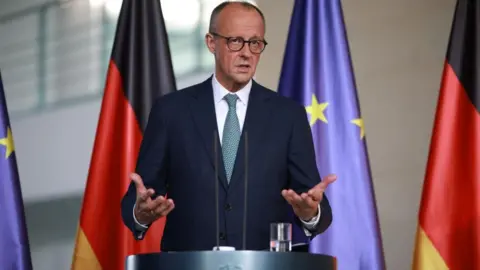The recent trade agreement forged between the European Union (EU) and the United States has elicited a wave of critical responses, primarily led by the leaders of France and Germany, who are expressing significant discontent with its implications. The meeting that resulted in this deal occurred at Trump’s Turnberry golf resort in Scotland, where EU chief Ursula von der Leyen and US President Donald Trump discussed trade relations. This agreement has been greeted with skepticism from several European capitals, especially as it involves a considerable tariff adjustment.
Chancellor Friedrich Merz of Germany voiced his concerns, stating that the deal could “substantially damage” Germany’s financial stability. Similarly, French Prime Minister Francois Bayrou characterized the agreement as a form of “submission,” underlining the perceived imbalance of power in negotiations between the two economic titans. This sentiment resonates across the continent where numerous leaders echo the downbeat sentiment regarding what they view as an imbalanced agreement, one that they felt forced to accept in order to avoid a potentially crippling trade war.
Under the terms of this newly minted deal, the EU will face a modest 15% tariff on most exports to the US, a rate that is significantly lower than the 30% tariffs that Trump had previously threatened. In return, Europe is expected to purchase more American energy and lessen taxes on specific imports. While some leaders have acknowledged the necessity of this compromise to prevent an all-out trade conflict, the reaction within Europe has predominantly been one of concern.
Despite this dreary outlook, the deal still requires ratification from all 27 EU members, a process complicated by the varied economic interests of each state. Although no member has indicated an intention to obstruct its implementation, the somber mood among European leaders suggests that there will be no jubilant celebrations regarding its approval. Analysts note that compromises were needed; however, figures like Merz caution that both US and European economies may suffer under the terms of the agreement. He suggested that the negotiating team in Brussels could hardly hope for better results when facing a US administration intent on altering trade relationships.
Bayrou’s stark comments on social media expressed a grave concern about the implications of such an alliance, calling it “a dark day” for free peoples who came together based on shared values. Meanwhile, Hungarian Prime Minister Viktor Orban, known for his close ties to Trump, suggested metaphorically that the US president had “eaten von der Leyen for breakfast,” illustrating the perception that the EU was on the losing end of the bargain. Spanish Prime Minister Pedro Sanchez also shared a measured outlook, supporting the agreement “without any enthusiasm,” reflecting the cautious acceptance that is prevalent among European leaders.
In the lead-up to the negotiations, there was increasing pressure among some European factions to utilize “anti-coercion measures” that would restrict American companies’ access to European markets. However, faced with the looming threat of significantly higher tariffs, the EU chose to strike a deal that, while still harming its economy, appears less detrimental than initially feared.
On the other hand, von der Leyen aimed to frame the agreement positively, describing it as a “huge deal.” However, by the following day, even those within her coalition voiced concerns, with Manfred Weber of the European People’s Party calling it a matter of “damage control.” The details of the agreement will be hashed out in upcoming technical discussions, as leaders and merchants express both skepticism and a measure of relief.
Finland’s prime minister remarked on the predictability this deal provides, while Irish Trade Minister Simon Harris emphasized the critical nature of certainty for jobs and investment. Maros Sefcovic, the EU’s trade commissioner, defended the agreement during a press conference, labeling it “the best deal we could get under very difficult circumstances,” emphasizing the importance of maintaining strong trade relations with the US, especially amidst geopolitical tensions related to the ongoing situation in Ukraine.
In summary, while the EU’s leaders recognize the need for a deal, their apprehension about its potential ramifications reveals deep concerns about their economic trajectory in relation to the United States and the inherent vulnerabilities within the terms they have negotiated.












